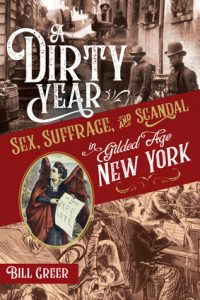An Election Year in the Mirror
by Bill Greer
When I started writing A Dirty Year, a woman was running for president of the United States, and the polls projected Hillary Clinton to win. The parallels with my story of 1872 New York were clear. One of the leading characters was Victoria Woodhull. By 1872, Woodhull had already upended Wall Street when she and her sister Tennie Claflin opened their brokerage firm and made headlines as the “Queens of Finance.” She had revolutionized the women’s suffrage movement with a speech to the House Judiciary Committee, the first ever by a woman, arguing that the Constitution already gave women the vote. And having “boldly entered the arena of politics and business” and thereby proven “the equality of woman with man,” she had announced her candidacy for the presidency.
For two years, Woodhull campaigned on a radical platform. Her fight for women extended far beyond winning the vote. She sought education and opportunity for women, for only with “the glorious freedom of self-support” could women choose how to live their own lives. Indeed, Woodhull intended her run for president to demonstrate that women possessed the “intellectual capacity for the highest political position.” But she advocated for far more than women’s rights. She aimed to pull the yoke off the oppressed working classes, the masses who toiled their lives long while a handful gathered up the spoils of their work. In May 1872, the Equal Rights Party she had built officially nominated her in a unanimous frenzy that brought a horde of passersby rushing in from Broadway.
Like Clinton, Woodhull didn’t win. The election that year was a bitter one. The administration of incumbent Ulysses S. Grant was notoriously corrupt. Even if Grant himself was not, many in the Republican Party refused to support him. A breakaway faction known as the Liberal Republicans joined with the Democratic Party to nominate Horace Greeley, the publisher of the New York Tribune. Backing Grant, the New York Times warned of Greeley supporters attacking Republican rallies, of fraudulent voter registrations running rampant. No, the Tribune argued, Grant’s people were dishing out vast sums of money to buy votes.
Election Day proved those charges nonsense, at least in New York. Police dragged a mere twenty suspected illegal voters into court, only to find nothing more serious than a woman demanding to vote for mayor. Fifteen women in Rochester led by Susan B. Anthony were more blatant violators of the election laws, a court ruled. They succeeded in casting ballots despite being persons “of the female sex.”
Woodhull herself spent Election Day in jail. She had been arrested on obscenity charges for publishing an article exposing the Reverend Henry Ward Beecher, known as the most famous man in America, for seducing a parishioner. She and her journal, Woodhull & Claflin’s Weekly, came under vicious attacks from federal prosecutors and judges she lumped together as US Government & Co., from the cabal that ran Beecher’s Plymouth Church, from newspapers across the country. Other editors ferociously defended Woodhull against the outrageous violation of the freedom of the press.
Anthony Comstock, a little-known vice hunter at the time, instigated Woodhull’s arrest. Earlier in the year, he had attacked New York’s smut dealers, confiscating tons of obscene books and photographs, along with rubber goods, as early birth control devices were called. Such devices being illegal, women in trouble turned to abortionists, numbering at least a hundred in New York. Comstock had chased them down as well. His arrest of Woodhull would propel him to national fame.
That was 1872. As we look at the period leading to our upcoming election, what do we see? We see the arrest of Harvey Weinstein instigating the #MeToo movement and the exposure of sexual improprieties reaching into the highest levels of business and politics. We see women striving for political office. We see cries of electoral fraud used as pretext for disenfranchising voters. We see battles over birth control access and states outlawing abortion, or trying to. We see a chasm between rich and poor growing ever wider. We see an administration attacking the press as fake news.
Are we looking into a mirror from 1872? On so many of these issues we are. But the reflection comes from the warped mirrors of a funhouse, the images distorted by the pandemic overwhelming everything else.
New York faced its own diseases in 1872. But the White Plague—tuberculosis—had infected the slums of New York for most of the century, and it no longer generated headlines or much interest beyond social reformers. The disease that invaded the city in the dirty year was the distemper attacking horses. Six days before the election, all New York’s horse car lines, the primary mode of public transportation, shut down. The streets emptied of virtually all vehicles. Dead animals littered the streets.
Fortunately horses taken out of service recovered. The horse car lines quickly restored most of their routes. The election was not disrupted.
Can we hope that the issues, not the pandemic we face, drive our upcoming election?
In 1872, the incumbent President Grant was reelected. In 2020, get out and vote!

Be sure to grab a copy of Bill Greer’s new book A Dirty Year!
No Comments
No comments yet.